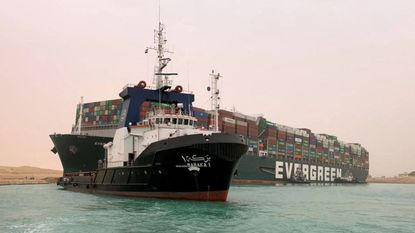There’s a big boat wedged in the Suez Canal. How will that affect the global economy?
The massive container ship stuck in the Suez Canal could be there for some time. John Stepek looks at how closing one of the world’s most important waterways could affect the global economy.


It probably hasn’t escaped your notice that there’s a big ship stuck in the Suez Canal. This is one of those weird situations where you simultaneously feel sorry for all of the people having a really tough week because of this, but also can’t help but see the funny side.
However, it’s taking a lot longer to dislodge said ship than anyone at first expected. Turns out – as with a lot of engineering problems – it’s not as easy as you might think to unwedge a huge cargo ship from a relatively tiny body of water.
So how long before we start to feel some distinctly unamusing knock-on effects?
Subscribe to MoneyWeek
Subscribe to MoneyWeek today and get your first six magazine issues absolutely FREE

Sign up to Money Morning
Don't miss the latest investment and personal finances news, market analysis, plus money-saving tips with our free twice-daily newsletter
Don't miss the latest investment and personal finances news, market analysis, plus money-saving tips with our free twice-daily newsletter
What happens if the Suez Canal stays shut?
The Suez Canal is an important trade route. How important? It is, says Gabriella Dickens of Capital Economics, “the world’s second-most important waterway through which roughly 10% of world trade passes each year”.
So the fact that a great big ship is wedged in it is a problem. (By the way, I very very rarely link to pieces of “outside” journalism in Money Morning – I’m selfish that way – but this FT piece really is very good on the mechanics of what’s happened here.)
The rapid creation of a Covid-19 vaccine has shown us very clearly that when a problem is important and costly enough, experts can work miracles. Vaccines that many thought would take several years to produce are now being pumped into everyone’s arms.
(Of course, being humans, we almost instantly lost sight of what an impressive achievement that is, dissolving instead into a morass of infighting and bickering over exactly who’d get what vaccines and when. But at least this shows that lockdowns haven’t fundamentally changed our collective character.)
However, the Suez situation is already taking longer to resolve than anyone initially expected. Salvage teams are now warning that the canal could end up being blocked for “weeks” according to a report in the FT.
I imagine that this is the point at which we’ve flipped from over-optimism to over-pessimism, but it’s worth having a think about what the knock-on effects might be. After all, if you can’t go through the Suez Canal, it’s a long and costly way around to get to where you wanted to go.
John Glen of the Chartered Institute of Procurement & Supply tells the FT: “If goods have to be rerouted via Africa due to the blockage this could add as much as ten days to delivery times for UK businesses. If this does happen, it will inevitably lead to shortages of goods and inflationary price rises for consumers.”
The problem here, as Dickens puts it, is that the grounding “could hardly have come at a worse time”. Global trade is already under pressure due to several factors, one of the main ones being that people are still buying lots of stuff.
“Freight rates for routes from Asia to the Mediterranean have already trebled since mid-November, with shipping capacity struggling to keep up with demand for traded goods.” This comes on top of producers already being under pressure from rising costs due to various bottlenecks (including a global shortage of microchips).
The longer-term effects of less secure supply chains
Even if prices rise, it seems unlikely to hit demand. Which in turn means that producers will be in a better position to pass these costs on to consumers. Which in turn spells inflation.
Sure, it’s probably short-term inflation. I mean, the ship will be shifted at some point. But there are rather a lot of these “short-term” inflationary forces about. Combined with all the money printing and spending that’s going on, you have to wonder if at some point it will turn into a “medium-term” and then maybe even a “long-term” inflation problem.
One thing’s for sure, it’s been good for the share price of big shipping companies who can now charge what they like (effectively). Taiwan-listed Evergreen is up by about 350% in the past year. I’m not sure I’d be keen to invest in that sector right now – I suspect that as soon as the ship is shifted their prices will dip even briefly.
What other markets might be affected? Oil hasn’t done a huge amount yet, partly because the Suez is not the Straits of Hormuz – some oil goes through the Suez but the main impact is on container shipping.
However, the oil price has already corrected from its recent big run up in any case, so if it gets a bit of momentum behind it, I wouldn’t be surprised to see it start climbing again.
Insurance will be affected too. We could see quite a few claims arising from this, although how big an impact won’t be clear until after it’s all done. (We ran an excellent piece on the opportunities in the insurance sector in this year’s first issue of MoneyWeek – you can have a read here.)
So overall – by itself, this Suez blockage is probably not a huge deal for the global economy. However, it is a bit ironic that it’s happened right now when there are so many other pressures on global supply chains. We’re looking at the end of the “just in time” era, and the dawn of the “just in case” era. Again, that’s likely to add to inflationary pressures in the longer run.
For more on all of this, make sure you subscribe to MoneyWeek – get your first six issues – plus a beginner’s guide to bitcoin – absolutely free.
John is the executive editor of MoneyWeek and writes our daily investment email, Money Morning. John graduated from Strathclyde University with a degree in psychology in 1996 and has always been fascinated by the gap between the way the market works in theory and the way it works in practice, and by how our deep-rooted instincts work against our best interests as investors.
He started out in journalism by writing articles about the specific business challenges facing family firms. In 2003, he took a job on the finance desk of Teletext, where he spent two years covering the markets and breaking financial news. John joined MoneyWeek in 2005.
His work has been published in Families in Business, Shares magazine, Spear's Magazine, The Sunday Times, and The Spectator among others. He has also appeared as an expert commentator on BBC Radio 4's Today programme, BBC Radio Scotland, Newsnight, Daily Politics and Bloomberg. His first book, on contrarian investing, The Sceptical Investor, was released in March 2019. You can follow John on Twitter at @john_stepek.
-
 Coventry Building Society bids £780m for Co-operative Bank - what could it mean for customers?
Coventry Building Society bids £780m for Co-operative Bank - what could it mean for customers?Coventry Building Society has put in an offer of £780 million to buy Co-operative Bank. When will the potential deal happen and what could it mean for customers?
By Vaishali Varu Published
-
 Review: Three magnificent Beachcomber resorts in Mauritius
Review: Three magnificent Beachcomber resorts in MauritiusMoneyWeek Travel Ruth Emery explores the Indian Ocean island from Beachcomber resorts Shandrani, Trou aux Biches and Paradis
By Ruth Emery Published
-
 UK wages grow at a record pace
UK wages grow at a record paceThe latest UK wages data will add pressure on the BoE to push interest rates even higher.
By Nicole García Mérida Published
-
 Trapped in a time of zombie government
Trapped in a time of zombie governmentIt’s not just companies that are eking out an existence, says Max King. The state is in the twilight zone too.
By Max King Published
-
 America is in deep denial over debt
America is in deep denial over debtThe downgrade in America’s credit rating was much criticised by the US government, says Alex Rankine. But was it a long time coming?
By Alex Rankine Published
-
 UK economy avoids stagnation with surprise growth
UK economy avoids stagnation with surprise growthGross domestic product increased by 0.2% in the second quarter and by 0.5% in June
By Pedro Gonçalves Published
-
 Bank of England raises interest rates to 5.25%
Bank of England raises interest rates to 5.25%The Bank has hiked rates from 5% to 5.25%, marking the 14th increase in a row. We explain what it means for savers and homeowners - and whether more rate rises are on the horizon
By Ruth Emery Published
-
 UK wage growth hits a record high
UK wage growth hits a record highStubborn inflation fuels wage growth, hitting a 20-year record high. But unemployment jumps
By Vaishali Varu Published
-
 UK inflation remains at 8.7% ‒ what it means for your money
UK inflation remains at 8.7% ‒ what it means for your moneyInflation was unmoved at 8.7% in the 12 months to May. What does this ‘sticky’ rate of inflation mean for your money?
By John Fitzsimons Published
-
 VICE bankruptcy: how did it happen?
VICE bankruptcy: how did it happen?Was the VICE bankruptcy inevitable? We look into how the once multibillion-dollar came crashing down.
By Jane Lewis Published